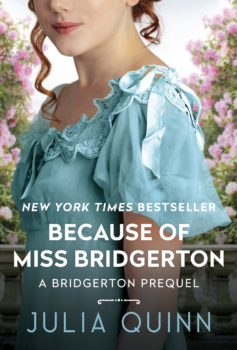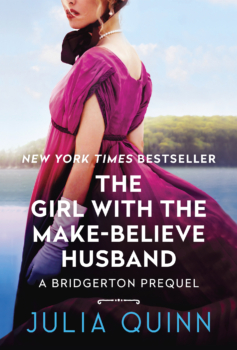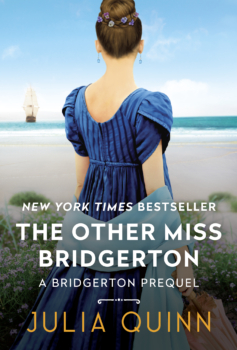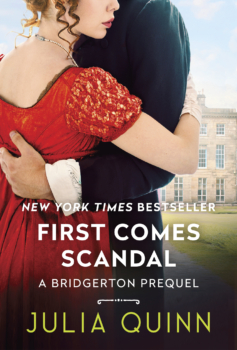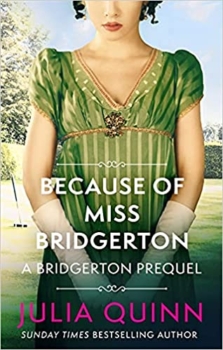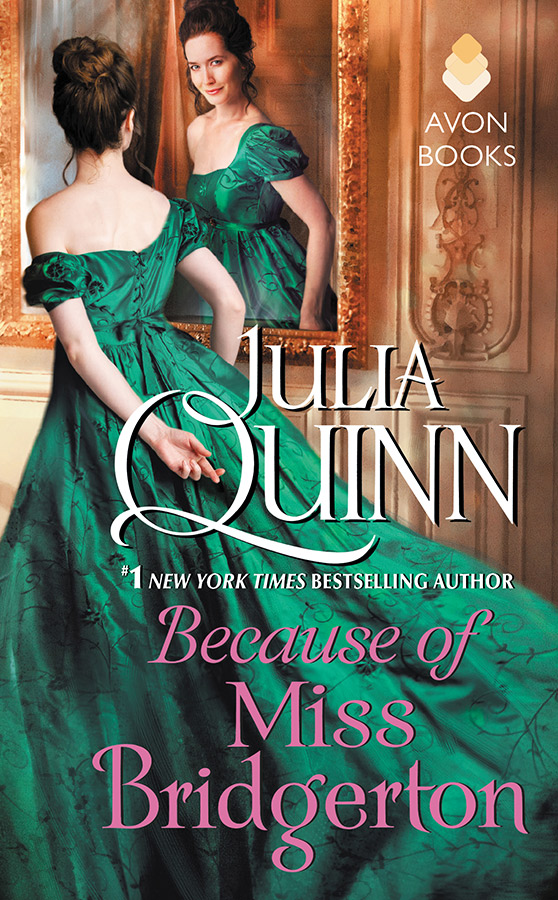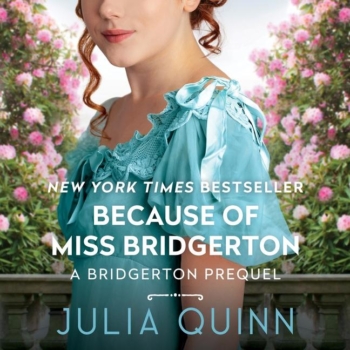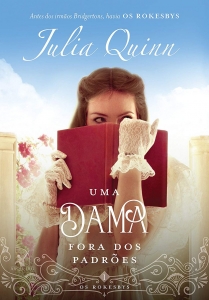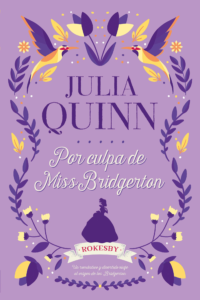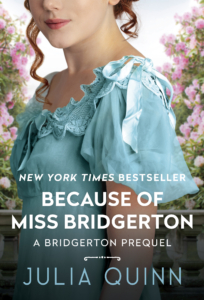Because of Miss Bridgerton
Book 1 in the
Rokesby Series
Sometimes you find love in the most unexpected of places…
This is not one of those times.
Everyone expects Billie Bridgerton to marry one of the Rokesby brothers. The two families have been neighbors for centuries, and as a child the tomboyish Billie ran wild with Edward and Andrew. Either one would make a perfect husband… someday.
Sometimes you fall in love with exactly the person you think you should…
Or not.
There is only one Rokesby Billie absolutely cannot tolerate, and that is George. He may be the eldest, and heir to the earldom, but he’s arrogant, annoying, and she’s absolutely certain he detests her. Which is perfectly convenient, as she can’t stand the sight of him, either.
But sometimes fate has a wicked sense of humor…
Because when Billie and George are quite literally thrown together, a whole new sort of sparks begins to fly. And when these lifelong adversaries finally kiss, they just might discover that the one person they can’t abide is the one person they can’t live without…
#1 New York Times bestselling author Julia Quinn presents the first novel of the delightful Bridgerton Prequel series in a stunning new package. There were Bridgertons before the eight alphabetically named siblings, and in this novel, we go back to where it all began. . .
 Start Reading Now
Start Reading Now
 Explore Inside this Story
Explore Inside this Story

Books in this series:
Find out more about the Rokesby Series →
-
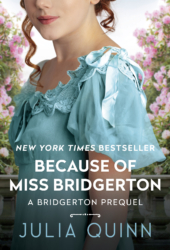
Inside the Story:
JQ’s Author Notes- I first got the idea of writing about an earlier generation of Bridgertons a few years after finishing On the Way to the Wedding, the final volume in the 8-book Bridgerton series. I knew I would never write a book about Edmund and Violet (the parents of the clan) but I thought it would be fun if they could appear as secondary characters during the time of their courtship. In the end, I decided to focus the series on the neighboring family (the Rokesbys), but the Bridgertons still loom large. Billie Bridgerton is seven years older than Edmund, though, so he is away at school during Because of Miss Bridgerton.
- I honestly don't know if the Royal Navy would have sent an officer with a broken arm home to convalesce. But I figured that if they were going to let anyone have some sick leave, it would be the son of an earl like Andrew Rokesby.
- Aristocratic young ladies like Billie had to be presented at court before being introduced to society, and the dress code was both extravagant and strict. Even as silhouettes grew slimmer and hoops became less fashionable, ladies were required to wear wide panniers at their presentation. It was extremely difficult to move in these gowns, and ladies often had to turn sideways to fit through doorways. The gown in this photo is from the 1750s, but Billie would have worn something similar two decades later.

Public Domain, as per metmuseum.org (The Metropolitan Musem). - I couldn't resist bringing back Pall Mall, Bridgerton style, and it was fun to discover the origin of the Mallet of Death. It was pointed out to me later that in The Duke and I, it is claimed that Anthony Bridgerton coined the term, but I like to think that it's one of those things that has entered family legend, and Anthony simply thinks he came up with it.

Bonus Features
Enjoy an Excerpt
from
Because of Miss Bridgerton
Chapter One
The roof of an abandoned farm building midway between Aubrey Hall and Crake House
Kent, England
1779
It wasn’t that Billie Bridgerton was lacking in common sense. On the contrary, she was quite sure that she was one of the most sensible people of her acquaintance. But like any thoughtful individual, she occasionally chose to ignore the little voice of reason that whispered through her mind. This could not, she was certain, be considered recklessness. When she ignored this cautionary voice, it was a conscious decision, made after a (somewhat) careful analysis of her situation. And to her credit, when Billie made a decision –one that most of humanity would deem beyond foolish– she usually landed quite sprightly on her feet.
Except when she didn’t.
Like right now.
She glared down at her companion. “I ought to throttle you.”
Her companion let out a rather unconcerned meow.
Billie let out a rather unladylike growl.
The cat assessed the noise, judged it to be beneath its notice, and began to lick its paws.
Billie considered the twin standards of dignity and decorum, decided they were both overrated, and returned volley with an immature scowl.
It didn’t make her feel any better.
With a weary groan, she looked up at the sky, trying to gauge the time. The sun was wedged quite firmly behind a layer of clouds, which complicated her task, but it had to be at least four o’clock. She reckoned she’d been stuck here for an hour, and she’d left the village at two. If she factored in the time it took to walk…
Oh bloody hell, what did it matter what the time was? It wasn’t going to get her off this damned roof.
“This is all your fault,” she said to the cat.
Predictably, the cat ignored her.
“I don’t know what you think you were doing up in that tree,” she continued. “Any fool would have known you couldn’t have got down.”
Any fool would have left it up there, but no, Billie had heard the mewling, and she’d been halfway up the tree before it occurred to her that she didn’t even like cats.
“And I really don’t like you,” she said.
She was talking to a cat. This was what she’d been reduced to. She shifted her position, wincing as her stocking caught on one of the weatherworn roof shingles. The snag jerked her foot sideways, and her already throbbing ankle howled in protest.
Or rather her mouth howled. She couldn’t help it. It hurt.
She supposed it could have been worse. She’d been well up in the tree, easily a good eight feet above the roof of the barn, when the cat had hissed at her, flung out a well-clawed paw, and sent them both tumbling.
The cat, needless to say, had made its descent with acrobatic grace, landing without injury, four paws on the roof.
Billie still wasn’t sure how she’d landed, just that her elbow hurt, her hip stung, and her jacket was torn, likely from the branch that had broken her fall two-thirds of the way down.
But the worst was her ankle and foot, which were killing her. If she were home, she’d prop it up on pillows. She’d witnessed more than her fair share of twisted ankles –some on her own body, even more on others– and she knew what to do. Cold compress, elevation, a sibling forced to wait on her hand and foot…
Where were her minions when she needed them?
But then, off in the distance she saw a flash of movement, and unless the local beasts had recently made the move to bipedalism, it was quite clearly human.
“Helloooooooo!” she called out, then thought the better of it and yelled, “Help!”
Unless Billie’s eyesight was deceiving her –and it wasn’t, it really wasn’t; even her best friend Mary Rokesby admitted that Billie Bridgerton’s eyes wouldn’t dare to be anything but perfect– the human in the distance was male. And there wasn’t a male of her acquaintance who could ignore a feminine cry for help.
“Help!” she yelled again, feeling no small bit of relief when the man paused. She couldn’t quite tell if he’d turned in her direction –perfect eyesight only went so far– so she let out another holler, this one quite as loud as she could make it, and nearly sobbed in relief when the gentleman –oh, please let him be a gentleman, if not by birth, then at least by nature– began to move in her direction.
Except she didn’t sob. Because she never sobbed. She would never have been that sort of a female.
She did, however, take an unexpected breath –a surprisingly loud and high-pitched unexpected breath.
“Over here!” she called out, shrugging off her jacket so that she could wave it in the air. There was no point in trying to appear dignified. She was, after all, stuck on a roof with a twisted ankle and a mangy cat.
“Sir!” she all but hollered. “Help! Please!”
The gentleman’s gait adjusted ever-so-slightly at the noise, and he looked up, and even though he was still too far away for Billie’s perfect eyes to see his face, she knew.
No. No. No. Anyone but him.
But of course it was him. Because who else would stroll by at her lowest moment, at her most awkward and embarrassing, at the one bloody time she needed rescuing?
“Good afternoon, George,” she said, once he’d drawn close enough to hear.
He put his hands on his hips and squinted up at her. “Billie Bridgerton,” he said.
She waited for him to add, “I might have known.”
He didn’t, and somehow that made her even more irritated. The world was not in balance when she couldn’t predict every inflated, pompous word that rolled out of George Rokesby’s mouth.
“Getting a bit of sun?” he inquired.
“Yes, I rather thought I could use a few more freckles,” she snapped.
He did not immediately respond. Instead he removed his tricorn hat, revealing an unpowdered head of thick, tawny brown hair, and regarded her with a steady, assessing gaze. Finally, after carefully setting his chapeau down on what had once been a stone wall, he looked back up and said, “I cannot say that I’m not enjoying this. Just a little bit.”
Any number of retorts danced on Billie’s tongue, but she reminded herself that George Rokesby was the only human being in sight, and if she wished to touch her feet to the ground before May Day she was going to have to be nice to him.
Until he rescued her, at least.
“How’d you come to be up there, anyway?” he asked.
“Cat.” Said in a voice that might charitably have been described as seething.
“Ah.”
“It was in the tree,” she explained, although heaven knew why. It wasn’t as if he’d requested further explanation.
“I see.”
Did he? She rather thought he didn’t.
“It was crying,” she ground out. “I couldn’t very well ignore it.”
“No, I’m sure you couldn’t,” he said, and even though his voice was perfectly cordial, she was convinced he was laughing at her.
“Some of us,” she pried her teeth apart long enough to say, “are compassionate, considerate individuals.”
He cocked his head. “Kind to small children and animals?”
“Quite.”
His right brow arched in that monstrously aggravating Rokesby manner. “Some of us,” he drawled, “are kind to large children and animals.”
She bit her tongue. First figuratively, and then literally. Be nice, she reminded herself. Even if it kills you…
He smiled blandly. Well, except for that little smirk at the corner.
“Are you bloody well going to help me down?” she finally burst out.
“Such language,” he scolded.
“Learned from your brothers.”
“Oh, I know,” he said. “Never could quite convince them you were actually a girl.”
Billie sat on her hands. She actually sat on her hands, she was so sure she would not be able to resist the urge to throw herself off the roof in an attempt to strangle him.
“Never could quite convince myself you were actually human,” George added, rather offhandedly.
Billie’s fingers hardened into claws. Which was really uncomfortable, all things considered. “George,” she said, and she heard a thousand different things in her tone–pleading, pain, resignation, remembrance. They had a history, they two, and no matter their differences, he was a Rokesby and she was a Bridgerton, and when push came to shove, they might as well be family.
Their homes –Crake House for the Rokesbys and Aubrey Hall for the Bridgertons– lay a mere three miles apart in this cozy green corner of Kent. The Bridgertons had been there longer –they had arrived in the early 1500s, when James Bridgerton had been made a viscount and granted land by Henry VIII– but the Rokesbys had outranked them since 1672.
A particularly enterprising Baron Rokesby (so the story went) had performed an essential service to Charles II and had been named the first Earl of Manston in gratitude. The details surrounding this elevation of rank had become murky over time, but it was generally accepted that it had involved a stagecoach, a bolt of Turkish silk, and two royal mistresses.
Billie could well believe it. Charm was inherited, was it not? George Rokesby might be precisely the sort of stick in the mud one would expect of the heir to an earldom, but his younger brother Andrew possessed the sort of devilish joie de vivre that would have endeared him to a notorious philanderer like Charles II. The other Rokesby brothers were not quite so roguish (although she supposed that Nicholas, at only fourteen, was still honing his skills), but they easily outstripped George in all contests involving charm and amiability.
George. They’d never liked each other. But Billie supposed she could not complain. George was the only available Rokesby at the moment. Edward was off in the colonies, wielding a sword or a pistol, or heaven only knew what, and Nicholas was at Eton, probably also wielding a sword or a pistol (although hopefully to considerably less effect). Andrew was here in Kent for the next few weeks, but he’d fractured his arm doing some such derring-do in the navy. He could hardly have been helpful.
No, it would have to be George, and she was going to have to be civil.
She smiled down at him. Well, she stretched her lips.
He sighed. Just a little. “I’ll see if there’s a ladder around back.”
“Thank you,” she said primly, but she didn’t think he heard her. He’d always had a fast, long-legged stride, and he’d disappeared around the corner before she could be properly polite.
A minute or so later he came back into view, his arm slung over a ladder that looked like it had last seen use during the Glorious Revolution. “What actually happened?” he called up, setting it into place. “It’s not like you to get stuck.”
It was as close to a compliment as she’d ever heard from his lips. “The cat was not as grateful for my assistance as one might have expected,” she said, every consonant a haughty ice pick directed at the monstrous little feline.
The ladder thunked into position, and Billie heard George climbing up.
“Is that going to hold?” she asked. The wood looked somewhat splintered and was emitting ominous creaking noises with every step.
The creaks paused for a moment. “It doesn’t really matter if it holds or not, does it?”
Billie swallowed. Another person might not be able translate his words, but she’d known this man since the dawn of her memory, and if there was one fundamental truth to George Rokesby, it was that he was a gentleman. And he would never leave a lady in distress, no matter how fragile a ladder’s appearance.
She was in trouble, ergo he had no choice. He had to help, no matter how aggravating he found her.
And he did. Oh, she knew he did. He had never made any effort to disguise it. Although to be fair, neither had she.
His head popped into view, and his Rokesby-blue eyes narrowed. All the Rokesbys had blue eyes. Every last one of them.
“You’re wearing breeches,” George said with a heavy sigh. “Of course you’re wearing breeches.”
“I would hardly have attempted the tree in a dress.”
“No,” he said dryly, “you’re much too sensible for that.”
Billie decided to let this one pass. “It scratched me,” she said, jerking her head toward the cat.
“Did it?”
“We fell.”
George looked up. “That’s quite a distance.”
Billie followed his gaze. The nearest branch was five feet up, and she had not been on the nearest branch. “I hurt my ankle,” she admitted.
“I reckoned as much.”
She looked over at him in question.
“You would have just jumped to the ground, otherwise.”
Her mouth twisted as she peered past him to the packed dirt that surrounded the ruins of the farmhouse. At one point the building must have belonged to a prosperous farmer because it was two full stories high. “No,” she said, assessing the distance. “It’s too far for that.”
“Even for you?”
“I’m not an idiot, George.”
He did not agree with her nearly as fast as he should have done. Which was to say, not at all.
“Very well,” was what he did say. “Let’s get you down.”
She breathed in. Then out. Then said, “Thank you.”
He looked over at her with a strange expression. Disbelief, maybe, that she’d uttered the words thank and you in the same sentence?
“It’s going to be dark soon,” she said, her nose crinkling as she looked up at the sky. “It would have been awful to have been stuck–” She cleared her throat. “Thank you.”
He acknowledged this with the briefest of nods. “Can you manage the ladder?”
“I think so.” It would hurt dreadfully, but she could do it. “Yes.”
“I could carry you.”
“On the ladder?”
“On my back.”
“I’m not getting on your back.”
“It’s not where I’d want you,” he muttered.
She looked up sharply.
“Right, well,” he continued, climbing another two rungs up. The edge of the roof was now even with his hips. “Can you stand?”
She stared at him dumbly.
“I would like to see how much weight you can put on that ankle,” he explained.
“Oh,” she mumbled. “Of course.”
She probably shouldn’t have attempted it. The slant of the roof was such that she’d need both her feet for balance, and her right was near to useless by this point. But she tried, because she hated showing weakness in front of this man, or maybe she tried just because it wasn’t in her nature not to try–anything— or maybe she just didn’t think the matter through in the first place, but she stood, and she stumbled, and she sat right back down.
But not before a choked cry of pain tore across her lips.
George was off the ladder and on the roof in a second. “You little fool,” he muttered, but there was affection in his voice, or at least as much affection as he ever showed. “May I see it?”
Grudgingly, she poked her foot in his direction. She’d already removed her shoe.
He touched it clinically, cupping her heel in one hand as he tested her range of motion with the other. “Does it hurt here?” he asked, pressing lightly on the outside of her ankle.
Billie let out a hiss of pain before she could stop herself and nodded.
He moved to another spot. “Here?”
She nodded again. “But not quite as much.”
“What about–”
A bolt of pain shot through her foot, so intense it was positively electric. Without even thinking, she yanked it back from his hands.
“I’ll take that as a yes,” he said with a frown. “But I don’t think it’s broken.”
“Of course it’s not broken,” she practically snapped. Which was a ridiculous thing to say because there was no of course about it. But George Rokesby always brought out the worst in her, and it didn’t help that her foot hurt, damn it all.
“A sprain,” George said, ignoring her little outburst.
“I know.” Petulantly. Again. She hated herself right now.
He smiled blandly. “Of course you do.”
She wanted to kill him.
“I’ll go first,” George announced. “That way if you stumble I’ll be able to stop you from falling.”
Billie nodded. It was a good plan, the only plan, really, and she’d be stupid to argue just because he was the one who’d come up with it. Even if that had been her initial impulse.
“Ready?” he asked.
She nodded again. “You’re not concerned that I’ll knock you off the ladder?”
“No.”
No explanations. Just no. As if it were absurd even to ponder the question.
She looked up sharply. He looked so solid. And strong. And dependable. He’d always been dependable, she realized. She was just usually too busy being irritated by him to notice.
He edged carefully back to the end of the roof, turning around so that he could set one foot on the top rung of the ladder.
“Don’t forget the cat,” Billie directed.
“The cat,” he repeated, giving her a surely you jest look.
“I’m not going to abandon it after all this.”
George gritted his teeth, said something quite unsavory under his breath, and reached out for the cat.
Which bit him.
“Mother of–“
Billie scooted back an inch. He looked ready to tear someone’s head off, and she was closer than the cat.
“That cat,” George growled, “can rot in hell.”
“Agreed,” she said, very quickly.
He blinked at her speedy acquiescence. She tried for a smile and settled for a shrug. She had two brothers by blood and three more who might as well have been brothers in the Rokesby household. Four if she included George, which she wasn’t quite sure she did.
The point was, she understood men, and she knew when to keep her mouth shut.
Besides, she was done with that cursed animal. Never let it be said that Billie Bridgerton was in possession of a sentimental heart. She’d tried to save the mangy beast because it was the right thing to do, then she had tried to save it again, if only because it seemed like a waste of her previous efforts not to, but now…
She stared down at the animal. “You are on your own.”
“I’ll go first,” George said, moving over to the ladder. “I want you right in front of me the whole way. That way if you stumble–”
“We’ll both go down?”
“I’ll catch you,” he ground out.
She’d been joking, but it didn’t seem the wisest course of action to point that out.
George turned to descend, but as he moved to set his foot on the highest rung, the cat, which had apparently not liked being ignored, let out a bloodcurdling screech and dashed through his legs. George pitched back, arms pinwheeling.
Billie didn’t think. She didn’t notice her foot, or her balance, or anything. She just leaped forward and grabbed him, pulling him back to safety.
“The ladder!” she shrieked.
But it was too late. Together they watched the ladder pivot, spin, then fall with a strange balletic grace to the ground.
Chapter Two
It would be fair to say that George Rokesby, eldest son of the Earl of Manston and currently known to the civilized world as Viscount Kennard, was an even-tempered gentleman. He had a calm, steady hand, a relentlessly logical mind, and a way of narrowing his eyes just-so that ensured that his wishes were met with cool efficiency, his desires granted with breathless pleasure, and –and this was the most important part– all of this occurred according to his preferred schedule.
It would also be fair to say that if Miss Sybilla Bridgerton had any idea how close he was to going for her throat, she would look a lot more frightened of him than she was of the gathering darkness.
“That’s most unfortunate,” she said, peering down at the ladder.
George did not speak. He thought this best.
“I know what you’re thinking,” she said.
He unclenched his jaw for just long enough to say, “I am not certain that you do.”
“You’re trying to decide which of us you’d rather toss from the roof. Me or the cat.”
She was a lot closer to the truth than one might have predicted.
“I was only trying to help,” she said.
“I know.” Said in a tone that was not meant to encourage future conversation.
But Billie just went right on talking. “If I hadn’t grabbed you, you would have fallen.”
“I know.”
She caught her lower lip between her teeth, and for one blessed moment he thought she was going to let the matter drop.
Then she said, “It was your foot, you know.”
He moved his head about an inch. Just enough to indicate he’d heard. “I beg your pardon?”
“Your foot.” She motioned with her head toward the extremity in question. “You kicked the ladder.”
George gave up all pretense of ignoring her. “You are not blaming this on me,” he all but hissed.
“No, of course not,” she said quickly, finally showing a shred of self-preservation. “I merely meant– Just that you–”
He narrowed his eyes.
“Never mind,” she mumbled. She let her chin rest on her bent knees and gazed out over the field. Not that there was anything to see. The only thing moving was the wind, declaring its presence through the light ruffling of the leaves on the trees.
“I think we have another hour before the sun goes down,” she murmured. “Maybe two.”
“We won’t be here when it gets dark,” he told her.
She looked at him, then down at the ladder. Then back at him with an expression that made him want to leave her in the proverbial dark.
But he didn’t. Because apparently he couldn’t. Twenty-seven years was a long time to have the tenets of gentlemanly behavior schooled into one’s brain, and he could never be so cruel to a lady. Even her.
“Andrew should be along in thirty minutes or so,” he said.
“What?” She looked relieved, then annoyed. “Why didn’t you say something? I can’t believe you let me think we would be stranded up here all night.”
He looked at her. At Billie Bridgerton, the bane of his existence since her birth twenty-three years earlier. She was glaring at him as if he’d committed some unspeakable affront, her cheeks high with color, her lips pursed like a furious rose.
With great and icy enunciation he said, “One minute has passed between the time the ladder hit the ground and this moment, right now, as these words are leaving my lips. Pray, tell me, when, during your enlightening analysis of the motion by which my foot connected with the ladder was I meant to offer this information?”
The corners of her mouth moved, but it wasn’t quite a smirk. It was nothing that indicated sarcasm. If she were anyone else, he would have thought her embarrassed, or maybe even sheepish. But this was Billie Bridgerton, and she didn’t do embarrassment. She just did as she pleased and damn the consequences. She had done her entire life, generally dragging half the Rokesby clan down with her.
And somehow everyone always forgave her. She had that way about her–it wasn’t charm exactly–it was that crazy, reckless confidence that made people flock to her side. Her family, his family, the entire bloody village–they all adored her. Her smile was wide, and her laugh was infectious, and God in heaven but how was it possible he was the only person in England who seemed to realize what a danger she was to humanity?
That twisted ankle of hers? It wasn’t the first. She’d broken her arm, too, in typically spectacular fashion. She’d been eight, and she had taken a tumble from a horse. A barely-trained gelding she’d had no business riding, much less trying to jump a hedge on. The bone had healed perfectly–of course it did, Billie had always had the devil’s own luck–and within months she was back to her old ways, and no one thought to scold her. Not when she rode astride. In breeches. On that same damned gelding over that same damned hedge. And when one of his younger brothers followed her lead and knocked his shoulder out of joint…
Everyone had laughed. His parents –and hers– had shaken their heads and laughed, and not a one of them thought it prudent to take Billie off the horse, shove her into a dress, or better yet, pack her off to one of those girls’ schools that taught needlework and deportment.
Edward’s arm had been hanging from its socket. Its socket!! And the sound it had made when their stablemaster had shoved it back in…
George shuddered. It had been the sort of sound one felt rather than heard. It had been horrible.
“Are you cold?” Billie asked.
He shook his head. Although she probably was. His coat was considerably thicker than hers. “Are you?”
“No.”
He looked at her closely. She was just the sort to try to tough it out and refuse to allow him to behave as a gentleman ought. “You would tell me if you were?”
She held up a hand as if to make a pledge. “I promise.”
That was good enough for him. Billie didn’t lie, and she didn’t break promises.
“Was Andrew in the village with you?” she asked, squinting off at the horizon.
George gave a nod. “We had business with the blacksmith. He stopped in to speak to the vicar afterward. I didn’t feel like waiting.”
“Of course not,” she murmured.
His head snapped around. “What is that supposed to mean?”
Her lips parted, then hovered for a moment in a delicate oval before she said, “I don’t know, actually.”
He scowled at her, then turned his attention back to the roof, not that there was a damned thing he could do at the moment. But it was not in his nature to sit and wait. At the very least he could examine the dilemma, reassess, and–
“There’s nothing to be done,” Billie said blithely. “Not without the ladder.”
“I’m aware,” he bit off.
“You were looking about,” she said with a shrug, “as if–”
“I know what I was doing,” he snapped.
Her lips pressed together in perfect concert with her brows, which rose into that annoying Bridgerton arch, as if to say–Go ahead, think what you wish. I know better.
They were silent a moment, and then, in a smaller voice than he was used to hearing from her, she asked, “Are you quite certain that Andrew will come this way?”
He gave a nod. He and his brother had walked to the village from Crake House–not their usual mode of transport, but Andrew, who had recently been made a lieutenant in the Royal Navy, had broken his arm doing some damn fool stunt off the coast of Portugal and had been sent home to recuperate. Walking was currently easier for him than riding, and it was an uncommonly lovely day for March.
“He’s on foot,” George said. “How would he come if not by here?” There were many footpaths in the area, but none that wouldn’t add a mile to the journey home.
Billie tipped her head to the side, gazing out over the field. “Unless someone gave him a ride.”
He turned slowly toward her, dumbfounded by the utter lack of… anything in her tone. There was no one-upmanship, no argument, not even a hint of worry. Just a bizarre, matter-of-fact–hmmm, here’s a disastrous thing that might have happened.
“Well, he could have done,” she said with a shrug. “Everyone likes Andrew.”
It was true, Andrew had the sort of devil-may-care, easy charm that endeared him to everyone, from the village vicar to the barmaids at the public house. If someone was heading his way, they’d offer a ride.
“He’ll walk,” George said firmly. “He needs the exercise.”
Billie’s face took on a decidedly dubious mien. “Andrew?”
George shrugged, not wanting to concede the point, even though Andrew had always been a superb athlete. “He’ll want the fresh air, at the very least. He’s been climbing the walls all week. Mother has been trying to put him on broth and bedrest.”
“For a broken arm?” Billie’s snort gave way to a giggle.
George glanced at her sideways. “Taking joy in the misery of others?”
“Always.”
He smiled despite himself. It was difficult to take offense, not when he’d spent the last week enjoying –nay, encouraging– his younger brother’s frustration.
Billie gingerly shifted her position, bending her legs so that she could rest her chin on her knees.
“Watch that foot,” George said, almost absently.
She nodded, and together they lapsed into silence. George stared straight ahead, but he could feel every motion Billie made at his side. She brushed an errant strand of hair from her eyes, she stretched one arm out in front of her, her elbow creaking like an old wooden chair. Then, with the tenacity she displayed in all aspects of her life, she circled back around to their previous conversation and said, “All the same, he could have got a ride.”
He almost smiled. “He could.”
She was quiet for a few more seconds, then said, “It doesn’t look like rain.”
He looked up. It was overcast, but not thickly so. The clouds were too pale to be holding much water.
“And surely we will be missed.”
He allowed himself a smirk. “I will, at least.”
She elbowed him. Hard. Hard enough to make him laugh.
“You’re a terrible person, George Rokesby.” But she was grinning when she said it.
He chuckled again, surprised by how much he enjoyed the light fizz of amusement in his chest. He wasn’t sure that he and Billie qualified as friends –they’d butted heads far too many times for that– but she was familiar. That wasn’t always a good thing, but right now…
It was.
“Well,” she announced, “I suppose there’s no one with whom I’d rather be stranded on a roof.”
He swung his head toward her. “Why, Miss Bridgerton, was that a compliment?”
“You can’t tell?”
“From you?” he parried.
She smiled in an endearingly lopsided manner. “I suppose I deserve that. But, you know, you’re very dependable.”
“Dependable,” he repeated.
She nodded. “Very much so.”
He felt himself scowl, although for all that was holy, he had no idea why.
“If I hadn’t hurt my ankle,” Billie continued blithely, “I’m sure I would have found a way down.”
He regarded her with clear skepticism. Aside from the fact that this had nothing to with his dependability… “Didn’t you just say that it’s too far to jump?”
“Well, yes,” she said, her hand making a dismissive little wave in front of her face, “but I would have thought of something.”
“Of course,” he said, mostly because he lacked the energy to say anything else.
“The point is,” she continued, “that as long as I’m here with you…”
Her face went suddenly pale. Even her eyes, normally a fathomless shade of brown, seemed to blanch down to something decidedly more tepid.
George’s heart stopped. He had never, ever seen Billie Bridgerton with such an expression on her face.
She was terrified.
“What is it?” he demanded.
She turned to him. “You don’t think…”
He waited, but she seemed beyond words. “What?”
Her ashen face took on a greenish hue. “You don’t think that someone would think that you… that we…” She swallowed. “That we disappeared… together?”
George’s entire world lurched. “God, no,” he said. Instantly.
“I know,” she agreed. With equal alacrity. “I mean, you. And me. It’s laughable.”
“Absurd.”
“Anyone who knows us…”
“Will know we’d never…”
“And yet…” This time Billie’s words did not merely trail off, they sank into a desperate whisper.
He gave her an impatient look. “What?”
“If Andrew doesn’t come along as expected… and you’re missed… and I’m missed…” She looked up at him, her eyes huge and horrified in her face.
“Eventually someone will realize that we’ve both been missed.”
“Your point?” he snapped.
She turned to face him directly. “Just that why wouldn’t someone assume…?”
“Because they have a brain in their head,” he shot back. “No one would ever think I would be with you on purpose.”
She lurched back. “Oh, well, thank you.”
“Are you saying you wish someone did?” he retorted.
“No!”
He rolled his eyes. Women. And yet, this was Billie. The least womanly woman of his acquaintance.
She let out a long, steadying breath. “Regardless of what you think of me, George…”
How did she make his name sound like an insult?
“…I do have my reputation to consider. And while my family knows me well enough, and” –her voice took on a reluctant edge here– “I suppose trusts you well enough to know that our concurrent disappearances signify nothing untoward…”
Her words trailed off, and she chewed on her lip, looking uncomfortable, and, if one was honest, vaguely ill.
“The rest of the world might not be as kind,” he finished for her.
She looked at him for a moment, then said, “Quite.”
“If we’re not found until tomorrow morning…” George said, mostly to himself.
Billie finished the horrifying sentence. “You’d have to marry me.”
Because of Miss Bridgerton
by Julia Quinn
is available in the following formats:
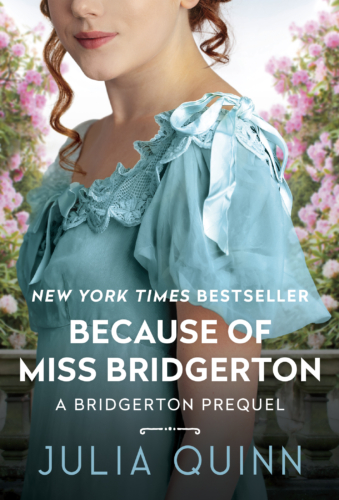
Mass Market Paperback:

The United Kingdom:
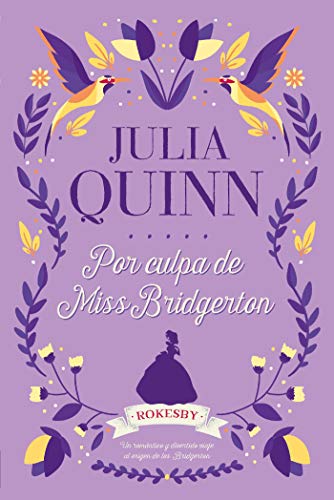

Collections:

Collections:
Not ready to order yours? Check out this story's overview. Read the excerpt. Listen to a bit on audio. Find out more about the series. There’s so much to love!
Awards & Achievements
-
 Because of Miss Bridgerton cemented #2 as Julia Quinn's favorite number. It reached #2 on the New York Times Mass Market Bestseller list, #2 on the New York Times E-Book Fiction Bestseller List, #2 on the New York Times Combined Print and E-Book Fiction Bestseller List. And on the USA Today bestseller list... #2!
Because of Miss Bridgerton cemented #2 as Julia Quinn's favorite number. It reached #2 on the New York Times Mass Market Bestseller list, #2 on the New York Times E-Book Fiction Bestseller List, #2 on the New York Times Combined Print and E-Book Fiction Bestseller List. And on the USA Today bestseller list... #2! - #7 on Buzzfeed's List of the 14 Most Buzzed About Books of 2016.
-
 Because of Miss Bridgerton was a nominee for Goodreads' Best Romance of 2016. While the ultimate winner ended up being It Ends With Us by Colleen Hoover, Because of Miss Bridgerton received 18,627 votes!
Because of Miss Bridgerton was a nominee for Goodreads' Best Romance of 2016. While the ultimate winner ended up being It Ends With Us by Colleen Hoover, Because of Miss Bridgerton received 18,627 votes! - Because of Miss Bridgerton was chosen as one of twelve audiobooks for the American Library Association's 2017 Listen List: Outstanding Audiobook Narration. According to the ALA website: "The 2017 committee listened to 1,919 hours of audiobooks, evaluated over 200 titles, debated 45 nominations, and narrowed the field to the final twelve winners. This award highlights extraordinary narrators and listening experiences that merit special attention by a general adult audience and the librarians who advise them." Click for an audio excerpt, and congratulations to narrator Rosalyn Landor!
-
 In August 2018 Uma Dama Fora Dos Padrões (or, as it's known in English, Because of Miss Bridgerton) hit the top spot on Veja‘s fiction list. Veja is a weekly newsmagazine and one of the most influential outlets of the Brazilian printed media.
In August 2018 Uma Dama Fora Dos Padrões (or, as it's known in English, Because of Miss Bridgerton) hit the top spot on Veja‘s fiction list. Veja is a weekly newsmagazine and one of the most influential outlets of the Brazilian printed media.




